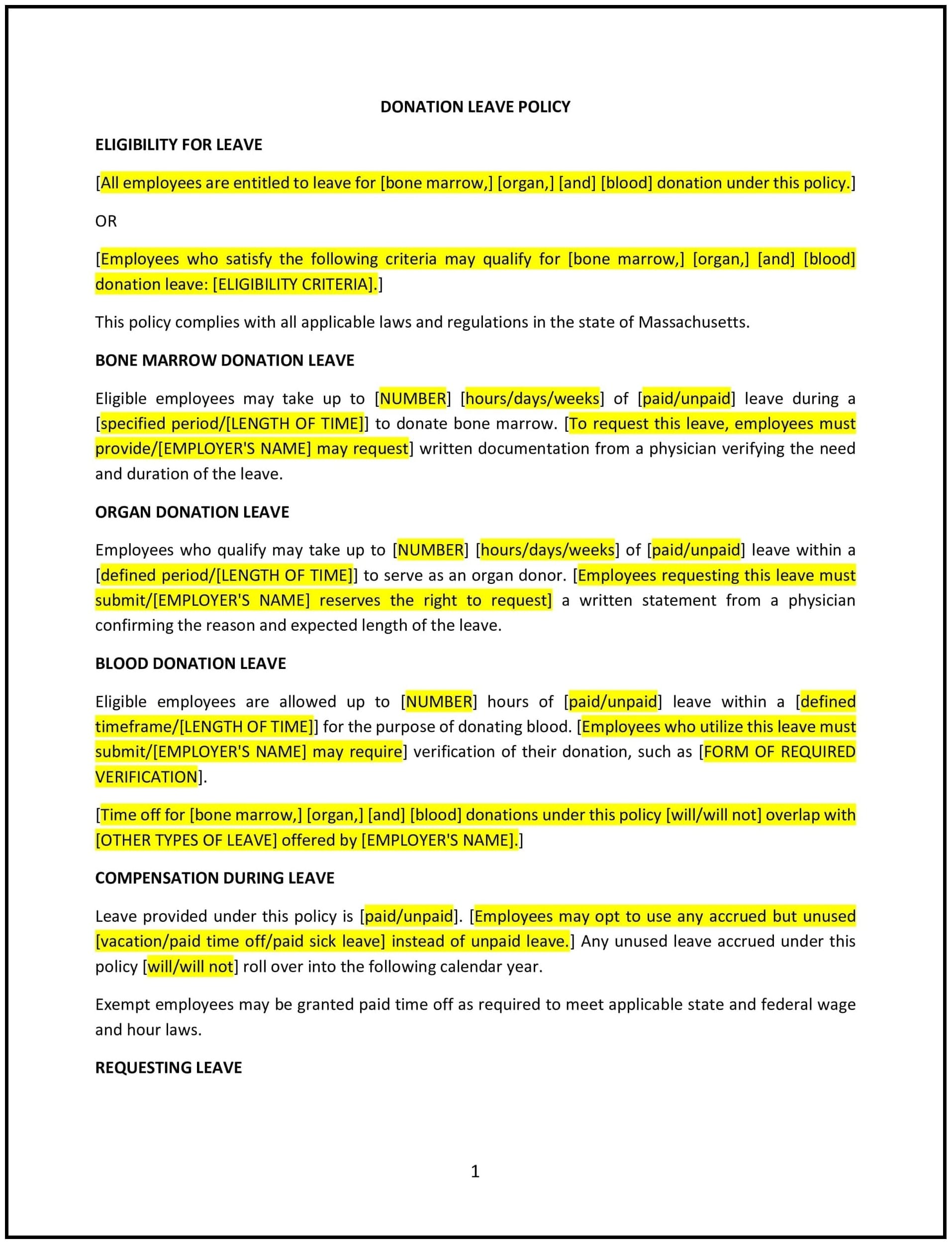Donation leave policy (Massachusetts): Free template
Got contracts to review? While you're here for policies, let Cobrief make contract review effortless—start your free review now.

Customize this template for free
This donation leave policy is designed to help Massachusetts businesses provide employees with the opportunity to donate time to charitable causes. The policy outlines the company’s commitment to supporting employees who wish to volunteer or participate in charitable activities by offering paid or unpaid leave for donation purposes. It also defines the guidelines for how donation leave can be used and the process employees must follow to request and track leave for charitable contributions.
By adopting this policy, businesses can encourage employee involvement in community service, enhance employee morale, and promote a positive corporate culture of giving back to the community.
How to use this donation leave policy (Massachusetts)
- Define donation leave eligibility: Clearly specify who is eligible for donation leave, such as full-time employees, part-time employees, or specific roles within the company. The policy should outline any length of service or tenure required before employees can access donation leave.
- Outline donation leave hours: Specify how much leave employees are entitled to for donation activities, such as a set number of paid hours per year for volunteering or contributing to charity work. The policy should clarify whether the leave is paid, unpaid, or a combination of both.
- Set guidelines for using donation leave: Define how donation leave can be used, including the types of charitable activities that qualify (e.g., volunteering at a nonprofit, participating in community outreach programs, or assisting in fundraising events). The policy should ensure that the activity aligns with the company’s values and charitable focus.
- Establish approval processes: Specify how employees should request donation leave, including the process for obtaining prior approval from their supervisor or HR. The policy should outline any documentation required, such as proof of participation in charitable activities or confirmation of volunteer hours.
- Address coordination with other leave types: Define how donation leave coordinates with other forms of leave, such as paid time off (PTO), sick leave, or vacation days. The policy should clarify whether donation leave is separate or integrated into other leave categories.
- Provide guidelines for paid or unpaid leave: Outline whether employees are paid for the time they spend on charitable activities or if the leave is unpaid. The policy should state any conditions for paid leave, such as a cap on the number of paid hours per year.
- Ensure compliance with Massachusetts and federal laws: Ensure that the policy complies with Massachusetts state laws regarding employee leave and volunteerism, as well as any federal regulations that may apply to employee leave for charitable purposes.
Benefits of using this donation leave policy (Massachusetts)
This policy offers several benefits for Massachusetts businesses:
- Enhances corporate social responsibility: By offering donation leave, businesses can demonstrate a commitment to corporate social responsibility, supporting charitable causes and encouraging employees to contribute to the community.
- Boosts employee morale and engagement: Employees who feel supported in their charitable efforts are more likely to be satisfied with their employer, increasing overall job satisfaction and engagement.
- Attracts top talent: A company that offers donation leave can attract employees who value community involvement and corporate social responsibility, making the company a more attractive place to work.
- Improves company reputation: Supporting charitable activities helps improve the company’s reputation as a socially responsible business that cares about making a positive impact on society.
- Strengthens community ties: By encouraging employees to participate in charitable activities, businesses help strengthen ties with the local community, which can lead to better relationships and opportunities.
- Reduces turnover: Employees who feel their employer supports their personal values and gives them time to contribute to charitable causes are more likely to stay with the company long-term.
Tips for using this donation leave policy (Massachusetts)
- Communicate the policy clearly: Ensure that all employees are aware of the donation leave policy, including the process for requesting leave, the types of charitable activities that qualify, and the number of hours available for donation leave. This can be communicated through employee handbooks, meetings, or newsletters.
- Offer opportunities for employee participation: Encourage employees to participate in charitable activities by organizing company-sponsored volunteer events or partnering with local organizations. This can increase employee involvement and foster a sense of community.
- Track donation leave usage: Keep records of employees’ donation leave hours and monitor participation to ensure that the policy is being used fairly and consistently.
- Provide flexibility: Allow employees to use donation leave at times that are convenient for them, without disrupting business operations. Flexibility in scheduling ensures that employees can balance their work responsibilities with their charitable efforts.
- Regularly review and update the policy: Periodically review and update the policy to ensure it aligns with the company’s values, employee needs, and any changes in Massachusetts or federal laws regarding leave or charitable activities.